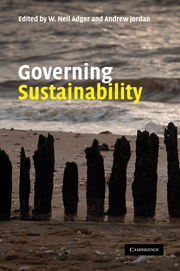Book contents
- Frontmatter
- Contents
- List of figures
- List of tables
- List of contributors
- List of abbreviations
- Foreword by Jonathon Porritt CBE
- Preface
- Part I Overview and Context
- Part II Governance and Government
- Part III Governance and Civil Society
- 6 Citizens, citizenship and governance for sustainability
- 7 The governance of science for sustainability
- 8 Practitioner evaluations of participatory processes in environmental decision making
- Part IV Governance and Decision Making
- Part V Conclusions
- Index
- References
7 - The governance of science for sustainability
Published online by Cambridge University Press: 05 June 2012
- Frontmatter
- Contents
- List of figures
- List of tables
- List of contributors
- List of abbreviations
- Foreword by Jonathon Porritt CBE
- Preface
- Part I Overview and Context
- Part II Governance and Government
- Part III Governance and Civil Society
- 6 Citizens, citizenship and governance for sustainability
- 7 The governance of science for sustainability
- 8 Practitioner evaluations of participatory processes in environmental decision making
- Part IV Governance and Decision Making
- Part V Conclusions
- Index
- References
Summary
Introduction
Knowledge, and hence science more generally, should play a key role in shaping human future development and thus the prospects for sustainable development. It should also play a key role in the framing of agendas for economic, social and political innovation. The governance of knowledge and, by implication, of science more generally, is thus an important part of governance for sustainable development. The governance of knowledge for sustainable development chiefly addresses the ways in which science is organised in society so as to achieve a transition to sustainable development. Exploring a new social contract for the practice and focus of science is the key focus of this chapter.
The questions of when, why and how knowledge influences action have been addressed in a wide range of studies with increasing attention in recent years to the environmental arena (Clark et al., 2006). The so-called ‘rational actor’ model assumes that policy makers undertake a careful analysis of the costs and benefits of available alternatives and always turn to scientists for an objective basis for their decisions (e.g. Lindblom, 1980). Other models see that decision makers are constrained with respect to their time, resources, knowledge and cognitive abilities and thus do not necessarily always turn to scientists for input (e.g. Kahneman et al., 1982). Kingdon (1984) argued that rather than knowledge informing decision making, policy choices are made when ‘windows of opportunity’ open and streams of problems and solutions that are usually independent come together.
- Type
- Chapter
- Information
- Governing Sustainability , pp. 142 - 158Publisher: Cambridge University PressPrint publication year: 2009
References
- 7
- Cited by



